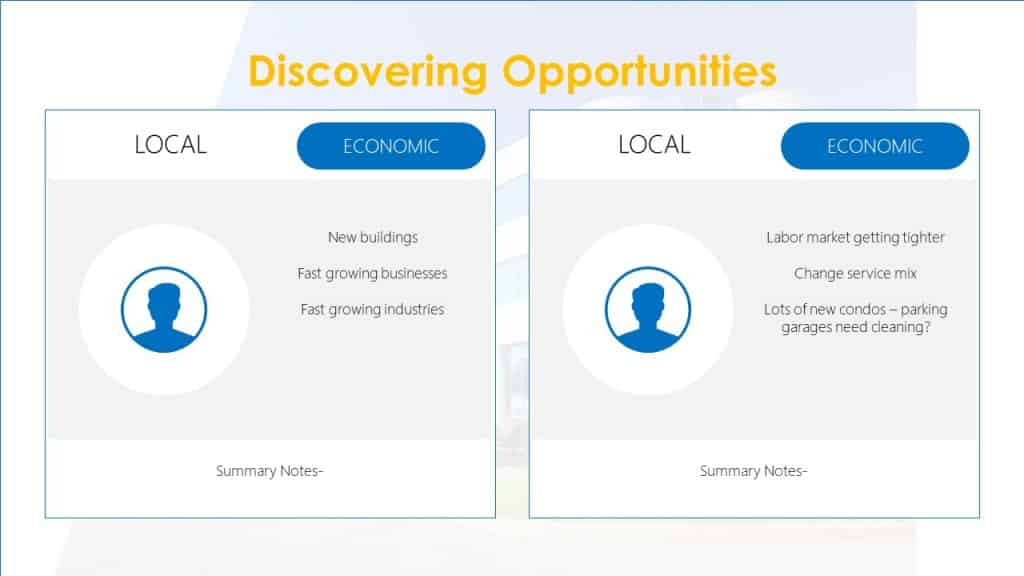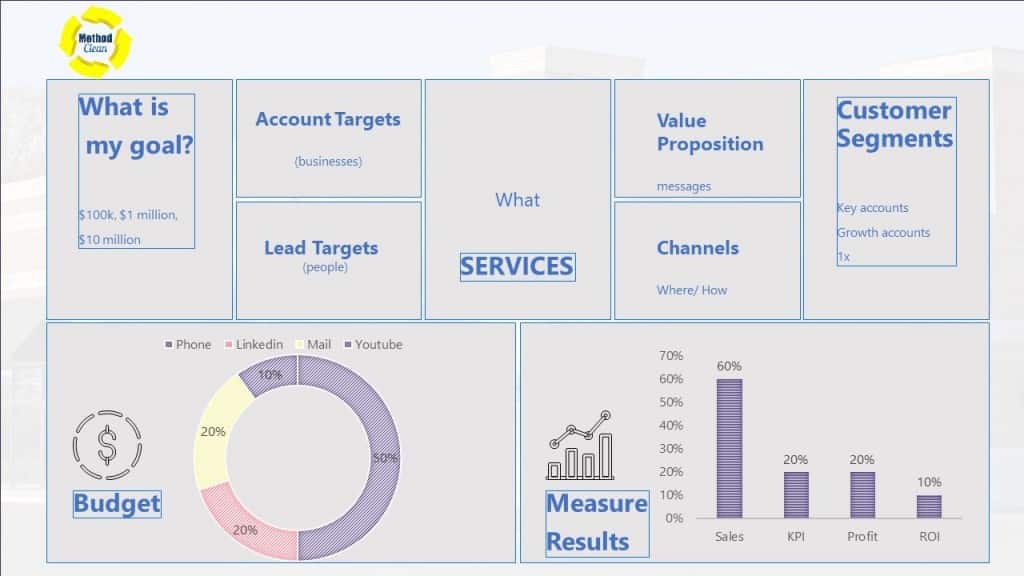Today’s topic is some of the ways to use commercial cleaning and janitorial software.
One of the main reasons to use a CRM or sales and marketing software is to segment your customers, prospects and leads into specific groups or tags. One reason is so you can easily find them later and two when you do find a specific group now you can create specific messages, information and promotions tailored to them.
Examples of tagging your database:
- Largest accounts or jobs
- Biggest referral sources
- Services: Example tile cleaning so then you can cross sell carpet cleaning
- Industry’s- medical, professional office, retail, restaurants
- Business size or employee size
- Square foot of the building
- Hot Leads
- Old Estimates
What is the point?
To put our marketing dollars in the best place to make a return, the highest probability of success. Instead of spending $1 per customer every year why not spend .50 cents and then $1.50 on your best customers?
CRM Best Practices
Keeping the Customers You Have
Customer Relationship Management (CRM) is based upon the now well-established principle that it costs less to keep the customers that you have than to try to win new ones – 5 to 8 times less expensive.
If you can keep your customers, they are also typically more profitable in the long term. New customers are often attracted by price deals or incentives, and because of this they usually move on as soon as the incentive has ended or another one is dangled before them.
It is the relationship that you establish with your loyal clients that will turn them into long-term customers, rather than the price alone.
It has been said by many Marketing Gurus that there is only one major differentiator in business today – SERVICE.
Customers no longer wish to be simply sold to, they wish to be given a service as well for their money. We need to offer them something extra, that equates to:
• Personal service
• Good communication
• Customer surveys or feedback
• Benefits and incentives
• Sharing of technical information
• Help with problem solving building issues
This service or these services add value to the basic product that you are selling, and most importantly, do so in a way that your competitor cannot provide!

What service do YOU provide that your competitor cannot?
Cleaning Service Industry is vast and highly unstructured.
• Deal with customers promptly
• Act professionally
• Be courteous
• Listen to what the customer have to say
• Try to meet or exceed the customers’ needs
• Give the customer compelling reasons to come back
Many ‘great’ service businesses have built their reputation on these ‘simple’ services alone, and yet most companies cannot even consistently provide the very basics of the service that their customers require.
Most companies take parts of the business and equip them to deal with customers. So, a customer may well be treated like royalty when dealing with the customer service team in face-to-face contact, but then is handled poorly on the phone by the technicians/cleaners.
Gaining New Customers
Using a sales software platform is the management of relationships with customers, leads and prospects.
In most sales, the contact with the customer is merely transactional, in building a relationship you have to leave behind the one transaction, two transaction, three transaction, more approach, and start at the very beginning with meeting and starting to build the relationship with the customer.
A broader definition of CRM is that it includes all activities that turn casual consumers into loyal customers by satisfying or exceeding their requirements to the extent that they will buy again.
“All activities” can mean just that.
Any activity that impacts upon the customer is worthy of CRM attention, and it is not a case of training but thinking strategically, and thinking CRM in every way, shape or form.
Goals of Using Sales Software
A CRM’s goal is to increase the opportunity by improving the process
To communicate with the right customer, providing the
right offer (service and price), through the
right channel, at the right time.
RIGHT CUSTOMER
• Manage customer relationships throughout their sales cycles
• Realize customer potential by increasing your share of their business
RIGHT OFFER
• Efficiently introduce customers and prospects to your business and its services
• Customize your offering for each customer
RIGHT CHANNEL(S)
• Co-ordinate communications with the customer across every customer touch point
• Ability to communicate to a customer’s channel preference
• Capture and analyze channel information for continuous learning
RIGHT TIME
• Efficiently communicate to customers based on time relevance
• Ability to communicate with real/near-real time or traditional marketing
Costs and Benefits of Database Management
The benefits to your business of using a commercial cleaning software are to be found in one or more of the following areas:
1. Lower costs of recruiting customers – savings on marketing, mailing, contact, follow-up, fulfilment, services, etc
2. No need to recruit so many customers to maintain a steady volume of business
3. Reduced cost of sales – Usually existing customers are more responsive customers. Better knowledge of your team and services. CRM will also reduce marketing campaign costs and provide higher ROI in marketing and customer communications
4. Higher customer profitability – larger share of their business; more follow-up sales; more referrals from higher customer satisfaction and services; ability to cross-sell or up-sell from present purchases.
5. Increased customer retention and loyalty – customers stay longer, buy more, contact you for their requirements (which increases the bonding relationship), and customer’s buy more often. CRM, therefore, increases the opportunity and accomplishment or real lifetime value.

Targeting Profitable Customers
Campaign Management can be sub-divided into small customer segments or even one-to-one marketing approaches. Dozens of campaigns can be achieved in a year, in a month, in a week or even in an evening – if you have the right information structure and process control.
However, the Return on Investment (ROI) from your customer focus does not truly accelerate until a business achieves the capabilities to “retain present profitable customers” and migrate “preferred customers” to new products, services, channels or relationships.
The ultimate marketing and ROI opportunity is to gain customer loyalty through repetitive purchases of your products and services, and then generate customer referrals to create new business opportunities and new customers.
The highest levels of profitability are achieved in the last stages of customer marketing and customer relationship: working together to obtain continuing and new relationships.
When you become the “customer’s advisor”, you have the customer’s understanding, belief, loyalty, and potentially increasing share of business.
As an advisor to your Key Accounts, CRM is your success opportunity.
Our software will use Database Marketing Techniques in order to determine an individual customer’s:
• Websites
• Type of information
• Historical Behavior
• Purchase Timing Opportunity
This information is gleaned from everyone who interacts with the customer, including you.
It also builds the knowledge base upon which to build the personal relationship that will enable the key account to function at its optimum and allows the lifetime value of the customer to be utilized to its ultimate.
Email Marketing
The good news with email marketing is the bad news. Email is super inexpensive which leads people to abuse it endlessly. All of us receive spam email, sometimes 100 of them a day for me. We want to avoid turning into that at all costs, this can ruin a relationship before it even begins.
The main point to always remember with email
• We are dealing with people, the whole beginning of this platform is about dealing with people. We always want to remember that in our emails. Personal>Business>Personal
How can you become more personal?
1. Add a picture
2. Start with a greeting (hello, good morning)
3. Write in a conversational tone (you can talk for a minute and then write similar to how you speak)
4. Stay away from spammy type of words or gimmicks
5. End with a personal note
6. Make the topics useful
What are the different ways we can use email?
1. Email drip campaign
2. Cold Prospecting one by one
3. Follow up with leads/estimates/customers
4. Content Marketing
5. E newsletters
6. Video
This is a tutorial on how to use a crm for commercial cleaning accounts through custom marketing
The difference between generic marketing and custom marketing would be for example sending one brochure about your company to every lead, prospect. Custom marketing or personalization would be creating a landing page, brochure for a very specific property manager based on what they have had interest in the past.
We are going to cover three main parts
We know business owners believe in custom marketing and have had success, where is the bottleneck
Two how to keep track of the information in sales software
How to read the prospect, customer and gain insight on what to do next
Every sales & marketing campaign works to some degree our mission is to fit the right campaign with the right account and lead to get the best return on investment, squeeze the most out of our marketing dollars.
Importance of Custom Marketing
What is the difference between generic marketing and custom marketing or personalization? Both work, especially when dealing with high volume of leads and prospects it can be impossible to customize each and every message and marketing piece.
An example of generic would be mailing a brochure to every business you want to clean for. Now if we have a list of thousands of businesses this is very practical.
With Account Based Marketing we want to focus on our KEY accounts, are main drivers of future growth and the best payoff. With key accounts we can take the time to customize because the payoff is there.
Some examples of custom campaigns would be creating a brochure just for property managers, writing a personal letter to a specific lead at an account. Creating a landing page just for a specific property manager and share with them.
In a recent study, 95% of business owners believe personalizing information will lead to better sales results.
80% of business owners have tried and experienced in real life better results than generic campaigns.
The question then is if we know these type of campaigns are successful and have experienced it, why not do more of it?
The short answer is it can just be too time consuming and most cleaning businesses do not have the information.
Lead Scoring
This is where the bottleneck generally happens with cleaning services, most of us are too small to have advanced data collection. With current technology now every cleaner can afford sales software which will give us the ability to not only collect information about our leads, prospects and customers but implement campaigns and generate sales, our goal remember is to get sales!
The goal of using flags or some platforms call tags is to be able to keep track of what type of information clients are interested in and how they like to receive it. Some leads will be perfectly fine with communicating on linkedin navigator while others wouldn’t even know what a linkedin is.
To younger cleaners direct mail might seem old fashioned but a large percentage of our contacts will be over 30 and most over 40. It’s important for us to think about how they like to consume information and not just what we like. Remember our goal is to get the best possible ROI not to be right.
Gaining Customer Insight and Reading the Tea Leaves
In this last section we are going to cover reading people, now that we have collected information the next step is applying it. We created two hypothetical cards of current leads.
Example 1
John Smith- we met on linkedin and he has shown interest in VCT floor cleaning, carpet cleaning, watching videos and prefers linkedin messaging. In the last note he stated they will be going out to bid in March next year.
See, now we know John is not taking bids until march there is not point in trying to close the sale. What we want to do instead is nurture this lead, sharing information for the next several months to keep us at top of the list when they do change.
I would still mix up the content type but would weight it to videos because he has watched videos in the past but that doesn’t mean he will not like other content.
In this scenario it would be great to share a landing page with text and a video. This way we are giving them options and letting him decide. I would continue to connect on linkedin and just share the link.
Would still mix in a direct mail piece also, if big enough a personal, custom letter.

How To Sell Key Accounts
What is Key Account Marketing? This is a shift from just getting commercial cleaning leads randomly to building long term relationships with people at specific businesses and specific industries or what we like to call our KEY ACCOUNTS.
What are some examples of Key Accounts? Medical buildings from 5000 to 10,000 square feet. Professional offices from 10 K to 30K square feet, medium sized non- franchised restaurants, all businesses within a 3 mile radius regardless of size.
The strategy is to shift our resources to the biggest payoff and not market to every business equally. Some businesses will spend $1200 year, while others might spend $50k. We want our marketing plan to reflect that.
Key account marketing has become important for many cleaning services. Driven by of 80/20 rule – 80% of current or potential revenues come from 20% of customers –
Many cleaning business owners have come to realize that these customers must be treated somewhat differently from the average customer. Of course, it is one thing to know this information, it is another to figure out exactly what to do.
What is a Key Account In The Cleaning Industry?
- Are they just the biggest ones?
- Are they the ones that offer the most gross profit?
- Are they the ones that will bring in future growth?
- Are they the ones that fit the industry you want to dominate in?
- Are they the ones that fit the geographic area?
- Are they the ones that have the most upselling or cross-selling potential?
A ‘key account’ might be the result of any one or more of the above within your cleaning service.
It is for your business to choose its own definition based upon the specifics of your area, your customers and your own business goals.
Key Account Marketing versus Sales
This can really hit home – if we apply 80% of our effort to just 20% of our leads (our Key Accounts) we will receive 80% of the rewards.
We are not just talking about our 20% Key Account Customers in terms of their size, but in terms of their profitability and sustainability.
A Key Account is also an investment in the future, read our blog on how I sold Charter Schools
This is where the biggest difference lies between selling and key account marketing
We need to live in the past, present, and future. We base sales on the past requirements of customers and present discussions with potential and new customers on their present and future needs. The majority of sales people are reactive to the needs of their customer, only being proactive when they need to cold call potential new customers.
Accounts versus Leads
This can be confusing at times at what is a Lead and what is an account. Especially on the internet Lead is a generic term used often that has many different meanings.
A simple way to think about this is a Lead is Person and an Account is a Business.
Accounts can be individual businesses or groups of businesses, in our example an account can be property managers as a group or ABC property management company, a specific business.
Leads are people, in an account we can end up having multiple leads. For Example ABC property management company can have 3 different leads we want to appeal too. The receptionist, manager and vice president. All of these people are important for our success selling this company.
The important part is understand this because each of these people are completely different demographics and can be found on different platforms.
To use ABC property management as an example, 1 specific manager might be in charge of 1 building but the vice president is in charge of 5 managers and 5 different buildings. This is why we want to find ways to influence that vice president. Maybe we can sell them a master deal to clean all 5 buildings and not just 1 or 2.
